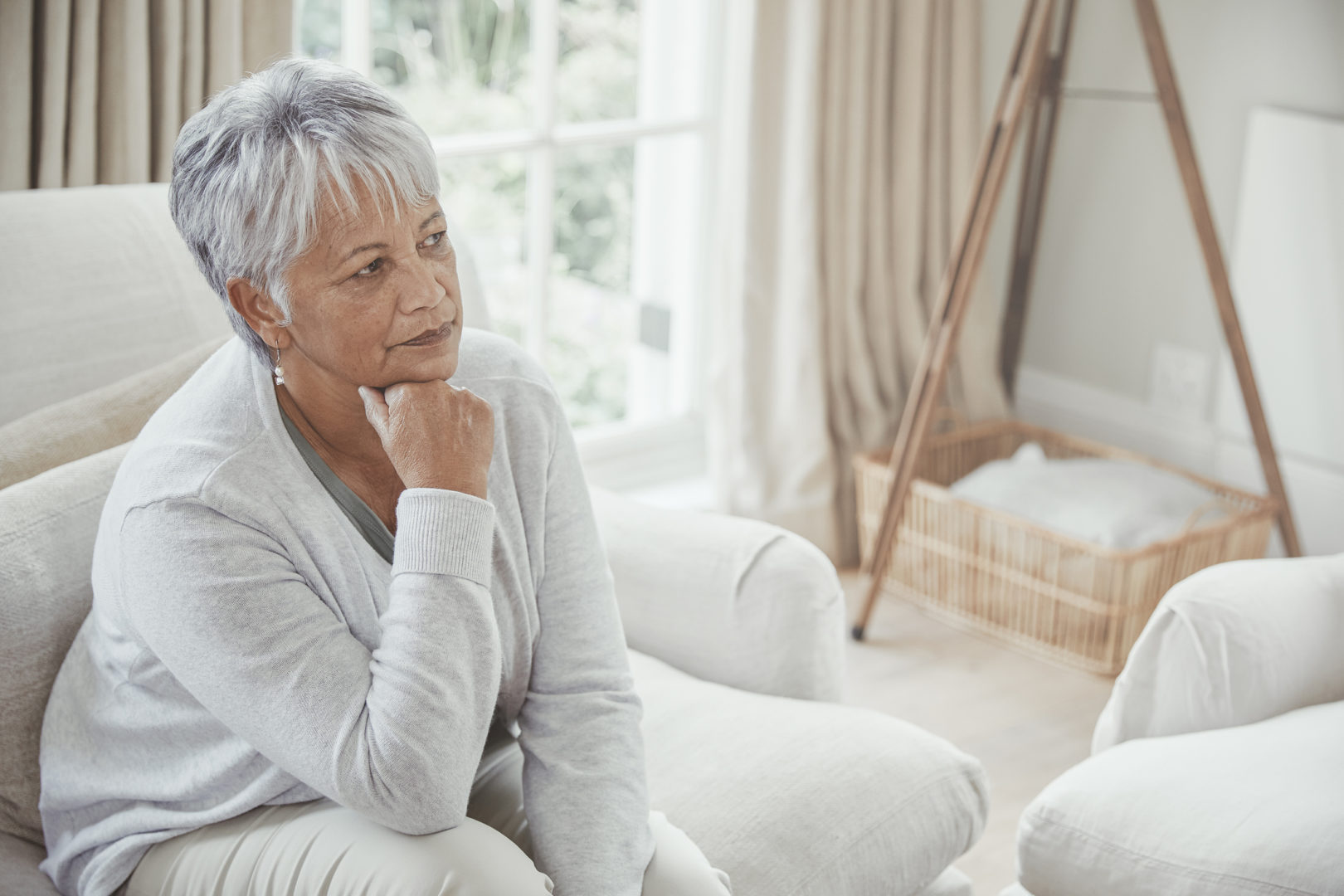Over the course of the pandemic, Black seniors in particular have been dealt a harder hand. According to a Kaiser Health News analysis of data from the CDC, among Black seniors aged 75 to 84, the death rate has been 3.5 times greater than for white seniors. Another survey from The Washington Post found that almost one-third of Black seniors know someone who has lost their life to the virus. For Black seniors struggling with mental illness, the pandemic has been especially hard.
Asli Amin, a 68-year-old from Northern Virginia, knows a bit about the fears, isolation and anxiety associated with the pandemic firsthand. She describes how her son, a restaurant worker, was afraid for her. While living together, she kept mostly to her room to minimize contact. They both wore masks and tried to maintain social distancing within the home. This led to her feeling increasingly lonely and confined within her home.
Amin’s situation is all too common. Research published in October 2020 from the Kaiser Family Foundation shows that 26% of Black seniors reported feeling anxiety and depression due to the pandemic.
Here are the factors contributing to the crisis, the big-picture changes that need to happen and what you can do to help.
The reasons why Black seniors’ mental health is suffering
Several factors are laying the groundwork for this mental health crisis, according to an older adult, researchers and the adult children of Black seniors that we interviewed:
Existing societal challenges
In many ways, the already existing barriers Black Americans face, such as systemic racism, lack of health insurance and access to healthcare have been compounded by the pandemic.
Black adults under 65 are less likely to have health insurance compared to their white counterparts. And among older Black adults, the rates of poverty are greater than white seniors. This impacts access to medical insurance and access to proper treatment, including mental healthcare, says Niro Feliciano, a licensed clinical social worker and cognitive psychotherapist in Wilton, Connecticut.
Socioeconomic factors
Robert Taylor, a doctor of social work and sociology and professor of social work at the University of Michigan, summarizes the unique circumstances surrounding this demographic. “Older African Americans are more likely to live in multigenerational households with younger relatives who are essential workers,” he says. They are also more likely than whites to live in poorer quality nursing homes and congregate living settings, all of which lead to a high risk of COVID mortalities.
The associated stress can lead to increased feelings of fear. A new study found that African Americans were more likely to report feeling afraid and threatened by the virus.
Living with chronic disease
Feliciano explains that Black adults have higher rates of chronic conditions, leading to death such as hypertension, diabetes, asthma and obesity.
The link to mental health? A literature review of depression among African Americans found that Black seniors with chronic disease were more likely to report depressive symptoms than those without chronic illnesses. And overall, older African Americans reported higher rates of depression than their white counterparts and had poorer outcomes.
Distrust of the medical community
Many Black seniors have lived through the reckoning of the civil rights movement, Jim Crow and the recent protests after George Floyd’s death. They are acutely aware of the role that racial discrimination in healthcare has played in harming their community. Research has also shown that implicit bias can lead to unequal treatment and negative health outcomes. For these reasons, it can be especially difficult for Black seniors to trust doctors with their mental health needs.
In fact, in a study published in Aging and Mental Health, older Black Americans expressed a mistrust of the medical community and of mental health treatment in particular, citing these as reasons for not seeking medical help with depression.
Pandemic-related hardships
The pandemic and subsequent lockdown has brought on financial and economic challenges that will be felt for generations to come. African-American families — who, prior to the pandemic, on average, had a net worth ten times less than that of the average white family — have been hit especially hard by the job losses. This stress can contribute to declining mental health.
Loneliness and social isolation
Church closures, for instance, have resulted in one less support system for older Black adults. “Older African Americans have very high levels of religious involvement including church attendance,” notes Taylor.
He says research indicates that the emotional support that older Black adults receive from fellow congregation members is protective for depressive symptoms and psychological distress. “Consequently, not being able to physically attend religious services increases social isolation, which can result in more depression and anxiety,” he notes.
How government can support Black seniors’ mental health
There are many ways in which the government can step up and aid older African Americans, according to the experts we spoke to. You can help advocate for these policies by writing a letter to your representative in Congress or reaching out to your local unit of NAACP.
1. Address housing and financial needs
Whether in lower-income nursing homes or multigenerational homes, older African Americans are more likely to be in poorer housing. Many of them may be responsible for taking care of grandchildren and other family members. These stressful conditions lead to an increase in depression. The government can help by providing economic relief for older Black adults, including housing security and cash benefits to meet the housing and financial needs of Black seniors, says Feliciano.
2. Increase access to internet
The internet has become the primary way many of us communicate, work and go to school during the pandemic. But not all Black seniors have access to the internet. According to the Pew Research Center, only 59% of adults over 65 have access to high-speed internet. “The percentage of Black American seniors is even lower, which affects their access to Zoom and other communication platforms” says Feliciano.
In turn, making it easier for Black seniors to get internet access can help them stay in touch with loved ones and access reliable health information, all of which can bolster their mental well-being.
3. Increase access to health services
Providing more comprehensive care and health insurance coverage is one of the ways we can support Black seniors with their mental health, says DeAnnah Byrd, a doctor of community health sciences at the Institute of Gerontology (IOG) at Wayne State University in Detroit. And making telehealth services more accessible or sending medical teams to nursing homes lacking resources could also help vulnerable seniors.
How you can help improve Black seniors’ mental health
You can donate to or volunteer for organizations that offer companionship and opportunities for social connection to Black seniors in your community. Here are a few to check out:
Support free education for Black seniors
Research and support local organizations that facilitate events or services focused on encouraging social connection among Black seniors. A couple examples:
-
In Detroit, IOG’s Healthier Black Elders Center (HBEC) provides Black seniors with free classes on health and aging.
-
For older African Americans from low-income backgrounds in the Greater Seattle area, the Program to Encourage Active, Rewarding Lives (PEARL) — run by the Catholic Community Services — provides in-home counseling and teaches techniques to manage minor depression.
Volunteer with or donate to meal delivery services
Volunteering with local meal-delivery organizations to deliver nutritious meals is a great way to support Black seniors’ mental health.
Shaneka Baylor, an ambulatory care clinical pharmacist who specializes in geriatric care, works with physicians and their senior patients adjusting medications for chronic diseases. She noticed that eating nutritious meals was a challenge for her senior patients, and it was negatively impacting their overall health, so she decided to purchase a franchise with meal prep service Chefs for Seniors.
Baylor notes that in addition to food, a big part of what they provide is companionship to seniors. Chefs for Seniors has multiple franchises and could be operating in a location near you.
You might also check out Meals on Wheels America, a large organization serving free nourishing meals to many senior communities. They’ve seen a 47% rise in the use of their services since March of 2020. They have many local chapters across the U.S.
Reach out to Black seniors in your life
A scheduled phone call or video call can help alleviate the feelings of isolation. Making the conscious effort to connect with others has made a difference for Amin. She says after she and her friends decided to schedule calls to stay in touch, her anxiety improved.
If there aren’t any Black seniors in your life, you can volunteer your time communicating with them through organizations like Letters Against Depression.
The bottom line: The COVID-19 pandemic continues to heavily impact the lives of Black seniors, threatening their physical and mental health. A comprehensive effort that addresses the many factors contributing to the high levels of anxiety and depression is needed to support this vulnerable population. We can all do our part to reach out and engage with the seniors in our lives and get through the stress of the pandemic together.
Hafsa Abdirahman MPH is a public health scientist and freelance medical writer and editor. She believes that access to evidence-based, quality health information can save lives and she’s worked throughout her career to put this belief into practice. You can find her at Health Culturally where she blogs about health issues facing the Somali community. Connect with her on LinkedIn.






